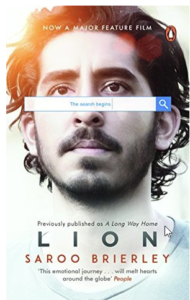 “Believe it to achieve it.” The moral of the story. That kind of faith will bask you in sunshine all your life.
“Believe it to achieve it.” The moral of the story. That kind of faith will bask you in sunshine all your life.

Lion
Saroo Brierley
Synopsis [ Source: Goodreads ]
They’ve gone.
I’ve been thinking about this day for twenty-five years. Growing up half a world away, with a new name and a new family, wondering whether I would ever see my mother and brothers and sister again. And now here I am, standing at a door near the corner of a run-down building in a poor district of a small, dusty town in central India – the place I grew up – and no-one lives there.
It’s empty.
The last time I stood here I was five years old.
The door, its hinges broken, is so much smaller than I remember it as a child – now I would have to bend over to fit through it. There’s no point in knocking. Through the window, as well as some gaps in the familiar crumbling brick wall, I can see into the tiny room my family shared, the ceiling only a little higher than my head.
This was my worst fear, so paralysing that I suppressed it almost completely – that once I finally found my home, after years of searching, my family wouldn’t be in it.
Not for the first time in my life, I’m lost and I don’t know what to do. This time I’m thirty, I’ve got money in my pocket and a ticket home, but I feel just like I did on that railway platform all those years ago – it’s hard to breathe, my mind is racing and I wish I could change the past.
Then the neighbour’s door opens. A young woman in red robes comes out of the better maintained flat next door, holding a baby in her arms. She’s curious, understandably. I look Indian, but my Western clothes are probably a little too new, my hair carefully styled – I’m obviously an outsider, a foreigner. To make matters worse, I can’t speak her language, so when she speaks to me, I can only guess that she’s asking me what I want here. I remember barely any Hindi and I’m not confident about how to pronounce the little I do know. I say, ‘I don’t speak Hindi, I speak English,’ and I’m astonished when she responds, ‘I speak English, a little.’ I point at the abandoned room and recite the names of the people who used to live there – ‘Kamla, Guddu, Kallu, Shekila’ – and then I point to myself and say, ‘Saroo.’
This time the woman remains silent. Then I remember something Mum gave me back in Australia, for just this situation. I scrabble around in my daypack and pull out an A4 page with colour photographs of me as a child. Again I point to myself, and then say ‘little’ as I point to the boy in the photographs. ‘Saroo.’
I try to remember who lived next door to us when this was my home. Was there a little girl who could now be this woman?
She stares at the page, then at me. I’m not sure if she understands, but this time she speaks, in hesitant English.
‘People . . . not live here . . . today,’ she says.
Although she is only confirming what I know, to hear her say it aloud hits me hard. I feel dizzy. I’m left standing there in front of her, unable to move.
I’ve always known that even if I managed to find my way back here, my family might have moved. Even in my short time with them, they had moved here from another place – poor people often don’t have much say in where they live, and my mother used to have to take whatever work she could get.
These are the thoughts that start coming out of the box I’ve put them in. The other possibility – that my mother is dead – I jam back inside.
A man who has noticed us approaches, so I start my mantra over again, reciting the names of my mother, Kamla, my brothers, Guddu and Kallu, my sister, Shekila, and me, Saroo. He is about to say something when another man wanders up and takes over. ‘Yes? How can I help?’ he says in clear English.
This is the first person I’ve been able to talk to properly since I arrived in India, and my story comes tumbling out quickly: I used to live here when I was a little boy, I went off with my brother and got lost, I grew up in another country, I couldn’t even remember the name of this place, but now I’ve found my way back here, to Ganesh Talai, to try to find my mother, my brothers and my sister. Kamla, Guddu, Kallu, Shekila.
He looks surprised at the story and I recite the family names yet again.
After a moment, he says, ‘Please wait here. I’ll be back in two minutes.’
My mind races with possibilities – what’s he gone to get? Someone who might know what happened to them? An address, even? But has he understood who I am? I don’t have to wait long before he’s back. And he says the words I’ll never forget: ‘Come with me. I’m going to take you to your mother.’
Richard Comments
The story is absolutely incredible, a very good story, but especially difficult to believe. A number of things make the story amazing: that a 5-year-old can piece together a memory puzzle that is more than twenty-five years old; that a 5-year-old survives in a country where older, physically bigger and stronger individuals succumb and fail; that a 5-year-old gets locked into a train for days while it travels hundreds of kilometres. If the story were fiction, a reader’s acceptance of it would be a challenge but the story is factual. The boy survived. The boy was locked in a travelling train. The boy survived in the streets of the huge, bustling, poverty dominated city of Calcutta.
The incredibility of the story creates the existential magnetism of the book. A first-time reader, if completely unaware of the outcome of the story, would find the narrative suspenseful and exciting. Can this young boy born in rural India survive in the hustle, bustle and survival of the fittest atmosphere of the largest city in the country? How does he do it? What does he do when faced with each new challenge to his survival? Begging for food in a competitive environment where others are bigger and stronger? How does he find food where even dogs and feral cats succumb to starvation?
The incredibility of the story is developed in so many ways: how lucky he is in so many situations, so many times, some even repeated. Yet the young author survived. Incredible how he ultimately ends up in an orphanage with a woman manager who has incredible luck and determination in finding homes for the truly lost, abandoned or homeless youngsters.
Again, it is unbelievably good luck that the author is adopted by a couple who live thousands of kilometres away in Australia, a Caucasian couple who are remarkably sensitive and empathetic to the young boy’s needs.
Another hard to believe fact is how the boy retains his relentless hold on his past and how his adopted parents help him in that retention. These parents encourage him, help educate him and develop his determination and drive to retain memories of his origins, his earliest years and his native culture.
Then the story’s incredibility continues with the development of technology, the social and professional contacts the growing boy man makes as he becomes a young man: train knowledgeable people, computer technology, Google’s geographic capabilities. Each of these factors adds a new piece to the puzzle of his origins and his first family.
The basis of the suspense in this story is founded on the ongoing and ceaseless questions relating to the situations the author experiences as the “lost” five-year-old. Will he get attacked by street thugs? Will he be attacked by vicious animals that live in the streets? Will he find food? Where will he find shelter? The survival challenges are endless and even harder to believe when considers that the author is a boy, even more wondersome, a rural boy with no urban survival skills. Even more astounding, he doesn’t even speak the language of his new environment. Worse, he can’t remember the exact name of his village, of the train depots he passed enroute to Calcutta. There are so many missing pieces to this boy’s origins puzzle, he has no chance of surviving. Yet, the fact is, he does.
Not only does he survive but with all kinds of small assistances along the way, he ultimately he returns to his home village where he must rely on memories from a quarter of a century ago to get him the last steps to his birth home. Again language barriers hinder his progress. No one understands him and he understands no one. Yet again, the kaleidoscope of puzzle pieces shifts in his favour. He encounters people who help him with the language, the geography and ultimately the last piece, finding his mother.
The story is phenomenal. The ending redeeming and wonderful.
Readability of the book
Saroo Brierley is not a writer. The story itself is what is captivating about the book. Otherwise, the narrative is pedestrian, pedantic and excruciatingly elementary. Sentences are simple, vocabulary prosaic, paragraph after paragraph of tedium. This is not a good book from a writer’s perspective, or a reader’s for that matter. One might argue that the simplicity of the narrative is an enhancement to its attraction. No, on the contrary, the writing style bores.
Recommendability
The book is a worthwhile read because it reinforces the indomitability of human beings. “Believe it and you will achieve it” seems undefeatable. That indomitability guarantees success, conquest and victory, no matter how great the challenges. Ultimately, mankind will always be victorious.
Wishful thinking or reality?





